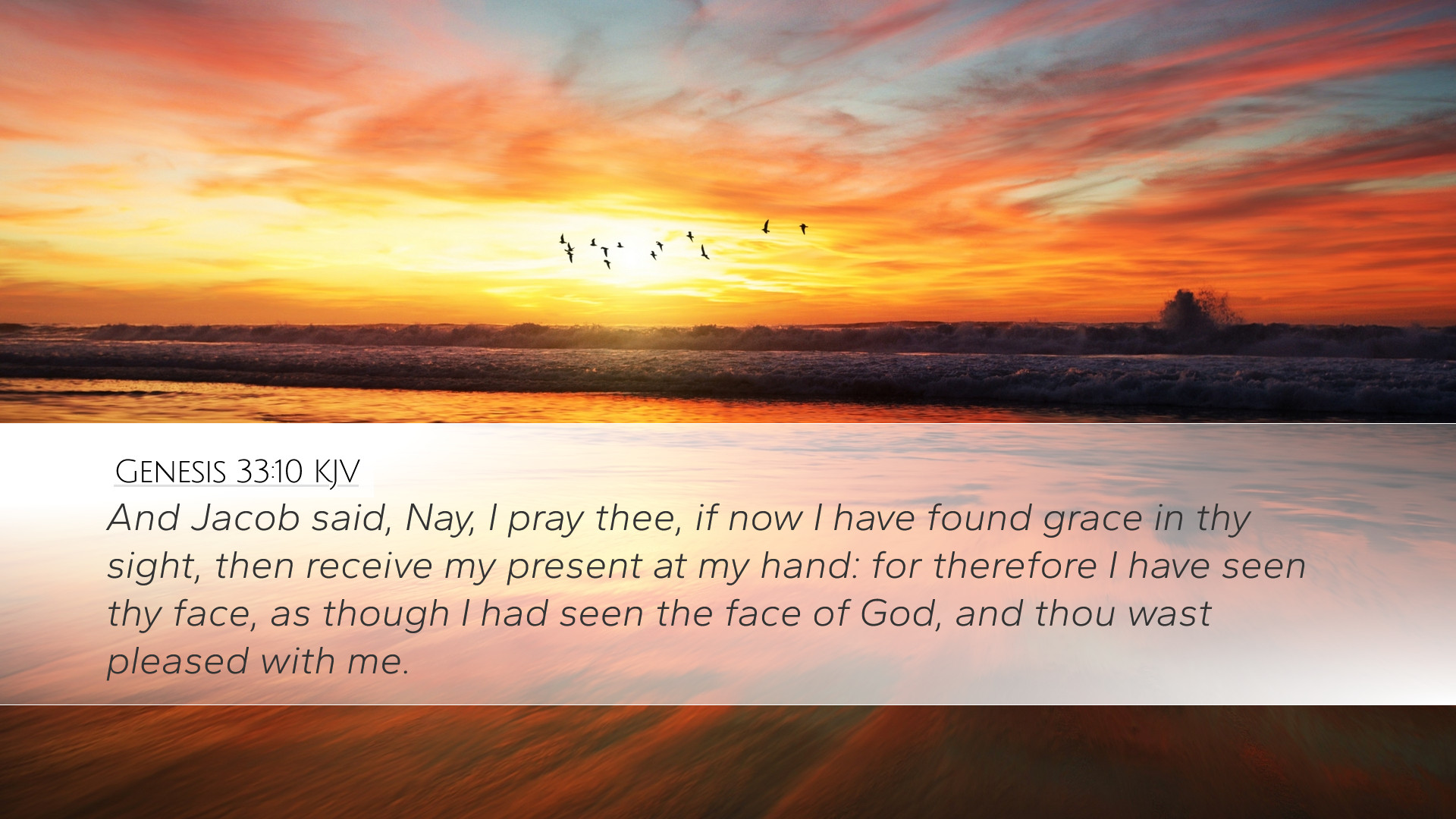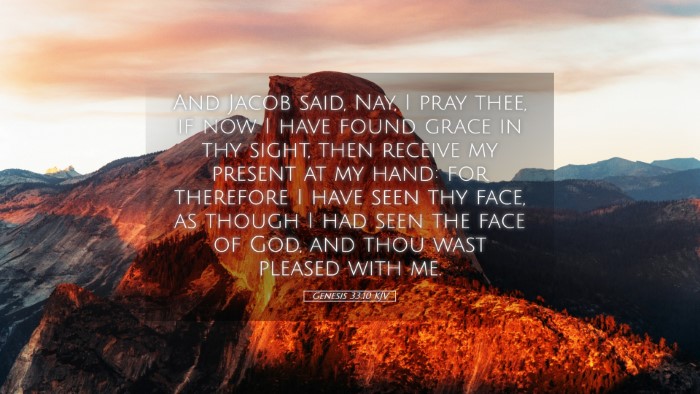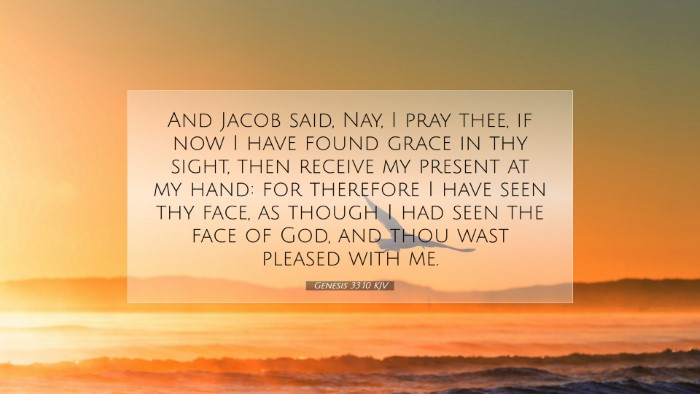Commentary on Genesis 33:10
Text of Genesis 33:10 (KJV): "And Jacob said, Nay, I pray thee, if now I have found grace in thy sight, then receive my present at my hand: for therefore I have seen thy face, as though I had seen the face of God, and thou wast pleased with me."
This verse occurs in a significant moment in the narrative of Jacob's reconciliation with his brother Esau after many years of estrangement and tension. The exchange between the two brothers is rich with theological and moral implications, reflecting the transformative power of grace, humility, and brotherly love.
Insights from Matthew Henry
Matthew Henry elaborates on the profound emotional and spiritual aspects of Jacob's encounter with Esau. He emphasizes the importance of grace in human relationships, noting that Jacob's acknowledgment of having "found grace" in Esau's sight indicates a deep awareness of the unearned favor he has received. This grace reflects not merely familial reconciliation but also the broader theme of divine grace manifested in human interactions.
Henry highlights Jacob's gift to Esau, interpreting it as a symbol of humility and the desire to make amends. He states that true repentance is often accompanied by tangible acts of kindness, and Jacob's willingness to give demonstrates his sincere contrition for past wrongdoings. The phrase "as though I had seen the face of God" underscores the transformative nature of reconciliation; coming face to face with Esau is akin to encountering the divine, pointing towards the idea that through peacemaking efforts, humans may experience the presence of God.
Insights from Albert Barnes
Albert Barnes reflects on the relational dynamics at play in Genesis 33:10, particularly focusing on Jacob's appeal to grace and his present. He notes that the concept of grace is central to understanding the reconciliation narrative, paralleling the grace that can be received within the community of faith. Jacob’s humility in offering a gift to Esau underscores the Christian principle of humility in relationships.
Barnes further discusses Jacob's metaphor of seeing the "face of God." He explains that this is emblematic of divine favor and acceptance. Just as Jacob wrestled with God and emerged transformed, so too is this present moment of reconciliation a culmination of Jacob's spiritual journey. It is a vivid reminder that true encounters with God often occur when we seek to rectify our relationships with others. This reflects a central tenet of Christian teaching, that loving God is inexorably linked to loving one's brother.
Insights from Adam Clarke
Adam Clarke provides a more nuanced interpretation of the gifts Jacob offers to Esau. He describes these gifts not merely as compensation but as an expression of Jacob's genuine contrition and an effort to restore right relationship. Clarke notes the cultural context of gift-giving in the Ancient Near East, emphasizing that such gestures were vital in reconciling estranged parties.
Clarke also elaborates on the significance of Jacob's statement about seeing the "face of God." He interprets this in light of Jacob's own transformation following his encounter with the divine at Peniel. The gift signifies that Jacob, who once took his brother's blessing deceitfully, is now humbly seeking Esau's goodwill. Clarke connects this incident to the broader theme of repentance and divine forgiveness, illustrating that genuine remorse and the efforts to restore relationships are core to experiencing God's presence in our lives.
Theological Reflections
This verse is rich with theological import, offering profound insights into the nature of grace and reconciliation. The interaction between Jacob and Esau serves as a microcosm for the Christian journey toward restoration and peace, emphasizing several key themes:
- The Nature of Grace: Jacob's recognition of grace in Esau's acceptance serves as a reminder that grace is often granted in the most unexpected places. Just as Jacob received grace from Esau, so too do we receive grace from God and from others in our lives.
- Humility and Repentance: Jacob's actions illustrate the necessity of humility in seeking forgiveness. True repentance is marked by actions that demonstrate our desire to restore relationships and take responsibility for our past actions.
- Transformation through Relationships: The transformation seen in Jacob is indicative of how restored relationships, grounded in grace, can lead to profound personal and spiritual growth. Encountering others in reconciliation can lead to encounters with the divine.
- God's Presence in Reconciliation: The idea that seeing Esau's face was like seeing the face of God emphasizes the theological truth that God is present in our efforts to love and reconcile with others, further urging believers to prioritize harmonious relationships.
Practical Applications
For pastors, students, and theologians, the insights from Genesis 33:10 encourage a deeper reflection on the role of grace in ministry and relationships. Consider the following applications:
- Embrace Grace: Encourage congregations to extend grace in their interactions, demonstrating that reconciliation is vital to the Christian witness.
- Model Humility: In leadership and community roles, exemplify humility by engaging in acts of reconciliation and making amends where needed.
- Promote Healthy Relationships: Foster environments where relationships are prioritized, recognizing that healthy communities reflect the love and grace of God.
- Teach Forgiveness: Use Jacob's story as a teaching tool to illustrate the power of forgiveness and the transformative nature of grace in relationships.
Conclusion
Genesis 33:10 encapsulates the essence of grace, repentance, and the transformative power of reconciliation. Through the interplay of Jacob and Esau’s relationship, we are reminded that our encounters with others hold the potential to reveal God's grace and presence. This verse challenges us to engage actively in the work of reconciliation, to embrace the humility that comes with genuine repentance, and to recognize the divine in our everyday interactions.


